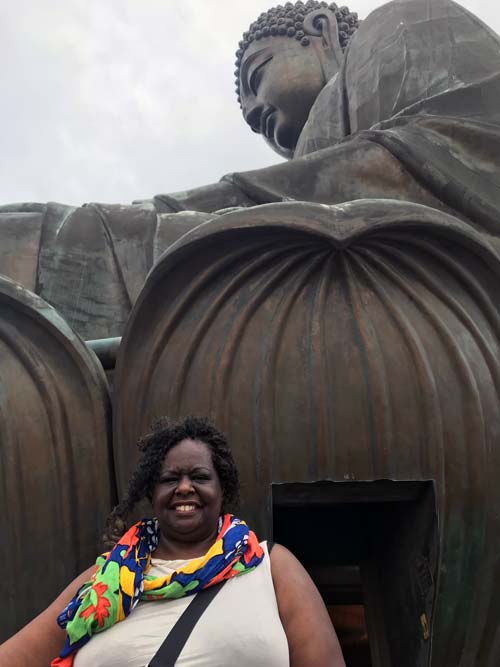Global business leadership professor takes part in faculty enhancement program
December 7, 2018
By Mike Killeen

If a professor asked Deborah Pembleton to write a paper on how she spent her summer vacation, she might snicker.
A paper? Is that all you want?
“It would be several books,” said Pembleton, associate professor of global business leadership at the College of Saint Benedict and Saint John’s University.
From June 10-30, she was part of a group of 10 professors who took part in the ASIANetwork Faculty Enhancement Program (ANFEP): Deepening Asian Studies in the Liberal Arts, devoted to the topic of “Religion in National and International Affairs in China and India.” The seminar was funded by the Mellon Foundation.
The goal of ANFEP was to facilitate the study of religion and public life in China and India by American scholar-teachers who seek to broaden their fields of expertise and deepen their knowledge of these Asian societies and cultures. Promoting inter-institutional linkages to expand exchanges of students and faculty and creating new research pathways and teaching materials are other program objectives.
The group came from a variety of academic disciplines.
“We all had an interest in Asia. And, we all had different approaches and different objectives for our research,” said Pembleton, who led the CSB/SJU study abroad trip to China in fall 2017.
They visited a number of cities in both countries, including Hong Kong and Shenzhen in China and Kolkata, Darjeeling and Sikkim in India. They heard numerous presentations on religion and visited churches, mosques, temples, religious centers and even Mother Teresa’s house.
The faculty participants have revised their syllabi, created new courses, published articles, established connections in Asia, undertaken new professional development activities. One faculty member produced a PowerPoint summary presentation that includes nearly 500 pictures from the trip.
The plan is that these resources will be incorporated into a new major on-line teaching resource database that is already under development by ASIANetwork through a grant from the Luce Foundation.
“I learned how much I didn’t know about the world, about China and India and about religion in those places,” Pembleton said. “My initial reaction was to come back and try to teach a joint course, perhaps with someone from the theology department, on world religion.
“But it was sensory overload,” Pembleton said.
One visit that did stand out was a visit to the University of Hong Kong, and a presentation on the school’s massive open online courses, or MOOCs.
“They shared with us a very extensive database of possible research areas where professors can access information,” said Pembleton, who conducted a Thursday Forum Dec. 6 on the topic. “I’ll be sharing with interested professors how they can link to some of those professors in China and India if they want to conduct joint research.
“That, I think, was the most powerful takeaway from this experience, linking individuals with professors in both urban and remote places of China and India,” she said.
Pembleton hopes local professors take advantage of these resources.
“They want to know about our culture and Western cultures, and I think it’s good for Western cultures to learn more about Asian cultures,” she said.
Pembleton was also fascinated by her visit to the state of Sikkim, located in the Himalayas in Northeast India. From a global business perspective, Sikkim plays a crucial role in China’s One Belt One Road Initiative, a revitalization of the Silk Road Economic Belt.
Surrounded by Nepal, the Tibet Autonomous Region of China and Bhutan, Sikkim has a population that represents many different ethnicities. Additionally, different religions are represented in this area, including Hinduism, Islam, Buddhism and Christianity.
“I was inspired by the rich cultural diversity of this region of India because cultural diversity is a common theme throughout all the classes that I teach,” she said. “The ANFEP program has better equipped me to teach about cultural diversity from a much broader, international perspective.”
With her Thursday Forum, “ASIANetwork Faculty Enhancement Program: Providing a Gateway to Collaborations in China and India,” Pembleton does not want to be seen as an expert, however.
“I’m more of a conduit – definitely a conduit,” she said, smiling.
